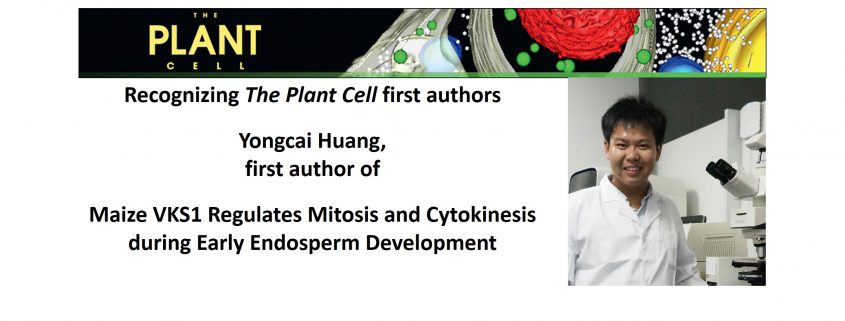Recognizing The Plant Cell first authors: Yongcai Huang
Yongcai Huang, first author of Maize VKS1 Regulates Mitosis and Cytokinesis during Early Endosperm Development
Current Position: Fourth-year Ph.D. student, CAS Center for Excellence in Molecular Plant Sciences/ Institute of Plant Physiology and Ecology
Education: M.phil-Ph.D in Genetics, CAS Center for Excellence in Molecular Plant Sciences/ Institute of Plant Physiology and Ecology, China; B.S., Sichuan Agricultural University, China
Non-scientific Interests: Reading, recording, hiking, and cooking
Brief bio: After finishing my undergraduate education in 2015, I was recommended to further my study in the Shanghai Institute of Plant Physiology & Ecology, Chinese Academy of Sciences. I was fortunate to join the research team of Prof. Yongrui Wu, where I went through systematic training in research and enjoyed the research process of maize biology, and also collaborated with other group members to publish papers on Plant Biotechnology Journal (Li et al., 2018) and The Plant Cell (Yang et al., 2018). Since I entered this research laboratory, I have started the research project on vks1 from scratch. With the joint efforts of the team, and through numerous attempts, we succeed in using immunofluorescence to study early endosperm development of maize in vivo for the first time. We performed cytological observations on the whole kernel development process and found that the main reason for the smaller size of the mutant kernel was the decrease in cell number during early endosperm development. Further genetic and molecular cytological studies have shown that due to the loss of function of a kinesin protein (ZmKIN11), during the rapid cell division of early endosperm, the nuclear-cytoplasmic domains formation and migration of free nuclei were affected, as well as the spindle assembly, sister chromatid separation and phragmoplast formation in early endosperm development, thereby resulting in reduced cell proliferation. Severity of aberrant mitosis and cytokinesis within individual vks1 endosperms differ, thereby resulting in varied kernel sizes. In this study we cloned and performed functional analysis of the key role of kinesin in the early endosperm development of maize for the first time, and revealed an important molecular mechanism for the determination of cell number in early endosperm that determines the final kernel size. This is a landmark for maize endosperm development research that combines one specific gene, forward genetics, cytogenetics, development mechanism and yield trait together. This study will be a good first step in this area.
论文: Maize VKS1 Regulates Mitosis and Cytokinesis during Early Endosperm Development
第一作者:黄永财
目前职位: 中国科学院分子植物科学卓越创新中心/上海植物生理生态研究所四年级在读博士生
教育经历:中国科学院上海生命科学院植物生理生态研究所,遗传学,博士&硕士;四川农业大学,本科
兴趣爱好: 阅读、记录、登山、做美食
科研经历简介:2015年本科毕业后,我保送进入中国科学院上海植物生理生态研究所,有幸加入巫永睿研究员课题组进行硕博连读。在这期间,我经历了系统的科研训练,享受玉米科学的研究过程,与本课题组其他成员合作的文章分别在Plant Biotechnology Journal (Li et al., 2018)和The Plant cell(Yang et al., 2018)上发表。自入学以来,我从头开展vks1这个课题的研究。在团队的共同努力下,经历无数次摸索,我们首次通过活体的免疫荧光方法研究玉米早期胚乳发育。我们对整个籽粒发育过程进行了细胞学观察,发现突变体籽粒变小的主要原因是早期胚乳发育过程中细胞数目减少。进一步的遗传和分子细胞学研究表明由于马达驱动蛋白(ZmKIN11)失去功能,在玉米早期胚乳快速的细胞分裂过程中,影响了游离核的核质域形成及迁移,以及在有丝分裂过程中纺锤体的组装、染色体的分离及成膜体的形成,最终影响了早期胚乳发育过程中细胞的增殖。一个纯合突变体果穗上不同籽粒由于有丝分裂和胞质分裂异常程度不同,从而导致大小变异的籽粒。这项研究首次克隆和功能解析了马达驱动蛋白在玉米早期胚乳发育过程中的关键作用,揭示了早期胚乳细胞数目增殖对最终籽粒大小决定的重要分子机理。这是玉米胚乳发育的一个里程碑式的研究,它将早期胚乳发育中特定基因、正向遗传学、细胞生物学、发育和产量性状联系在一起。这项研究将是这一领域良好的开端。




